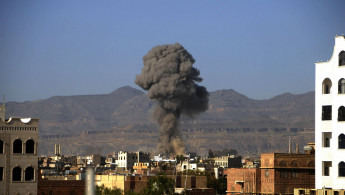UN probe reports possible 'war crimes' by all sides in Yemen conflict
All sides in Yemen's bloody conflict may have committed war crimes, UN investigators said on Tuesday, highlighting deadly airstrikes, rampant sexual violence, and the recruitment of young children as soldiers.
In their first report, a team of UN-mandated investigators said they had "reasonable grounds to believe that the parties to the armed conflict in Yemen have committed a substantial number of violations of international humanitarian law".
Many of these violations may amount to "war crimes" the report said, adding that investigators had identified a number of alleged perpetrators.
The devastating conflict in Yemen has left more than 10,000 people dead since March 2015, when a Saudi-led coalition intervened to fight Houthi rebels closing in on the last bastion of President Abedrabbo Mansour Hadi's government.
The conflict in what was already one of the world's poorest countries has caused what the United Nations has described as the world's worst humanitarian crisis.
 |
There is little evidence of any attempt by parties to the conflict to minimise civilian casualties |  |
The UN's so-called Group of Independent Eminent International and Regional Experts, which was created by the UN Human Rights Council last September, detailed a long line of abuses committed by all parties to the conflict.
"There is little evidence of any attempt by parties to the conflict to minimise civilian casualties," said the group's chairman Kamel Jendoubi in a statement.
The report concluded that "coalition airstrikes have caused most of the documented civilian casualties," pointing to a large number of strikes on residential areas, markets, funerals, weddings, detention facilities, civilian boats and medical facilities.
"The specific cases investigated by the Group of Experts raise serious concerns about the targeting process applied by the coalition," the report said, pointing out that in many cases there were no apparent military targets in the vicinity of the attacks.
Child soldiers
The report covers the period from September 2014 through June 2018, and does not address the latest series of deadly strikes that have killed dozens of children in rebel-held areas and sparked international outrage.
The coalition has not confirmed or denied it carried out two air raids last Thursday that the UN said killed at least 26 children and four women south of the flashpoint rebel-held city of Hodeida.
Those deaths came after a coalition attack on a bus in the northern rebel stronghold of Saada early this month killed 40 children, prompting UN Secretary-General Antonio Guterres to call for an independent investigation of attacks targeting civilians in the three-year war.
While thousands of children have been killed in air strikes, young Yemenis have also been conscripted.
The experts said they had "received substantial information indicating that the Government of Yemen, the coalition-backed forces and the Houthi-Saleh forces have all conscripted or enlisted children into armed forces or groups and used them to participate actively in hostilities".
"In most cases, the children were between 11 and 17 years old, but there have been consistent reports of the recruitment or use of children as young as eight years old," they added.
Collateral damage
On Monday, the spokesman for the Saudi-led military coalition battling Houthi rebels in Yemen defended the coalition's reckless record in the war-torn country, stating there cannot be a war without collateral damage.
Turki al-Maliki accused the UN of "biased" reports on air strikes that allegedly killed dozens of children in rebel-held areas, saying there is no war without collateral damage.
"The coalition is surprised by the... biased positions of some reports," said coalition Spokesman Turki al-Maliki, adding that the information was "prejudiced" and based on "rebel stories".
"We all know that UN bodies are under pressure by the Houthi militias ... and these reports may have come in response to that pressure," Maliki said, adding "there is no war without collateral damage".





 Follow the Middle East's top stories in English at The New Arab on Google News
Follow the Middle East's top stories in English at The New Arab on Google News
![The UAE is widely suspected of arming the RSF militia [Getty]](/sites/default/files/styles/image_330x185/public/2024-11/GettyImages-472529908.jpg?h=69f2b9d0&itok=Yauw3YTG)
![Netanyahu furiously denounced the ICC [Getty]](/sites/default/files/styles/image_330x185/public/2024-11/GettyImages-2169352575.jpg?h=199d8c1f&itok=-vRiruf5)
![Both Hamas and the Palestinian Authority welcomed the ICC arrest warrants [Getty]](/sites/default/files/styles/image_330x185/public/2024-11/GettyImages-2178351173.jpg?h=199d8c1f&itok=TV858iVg)